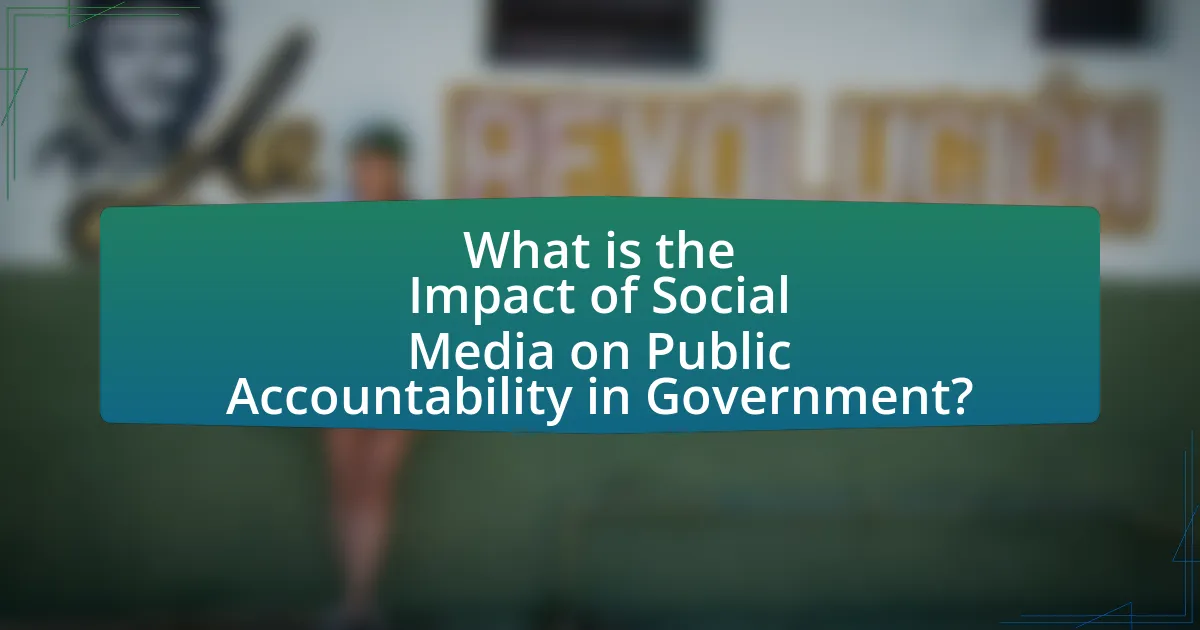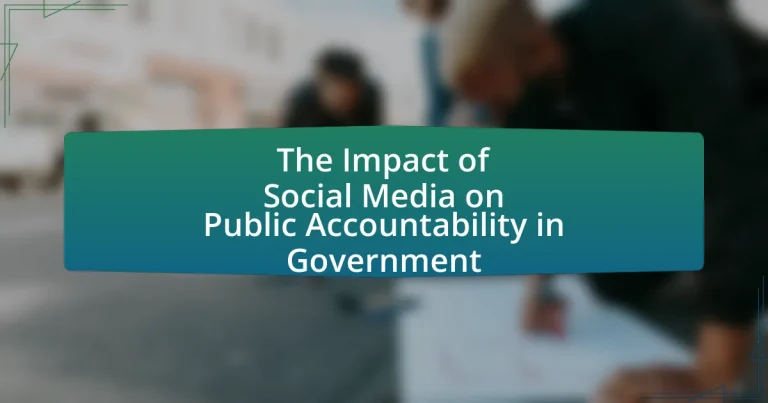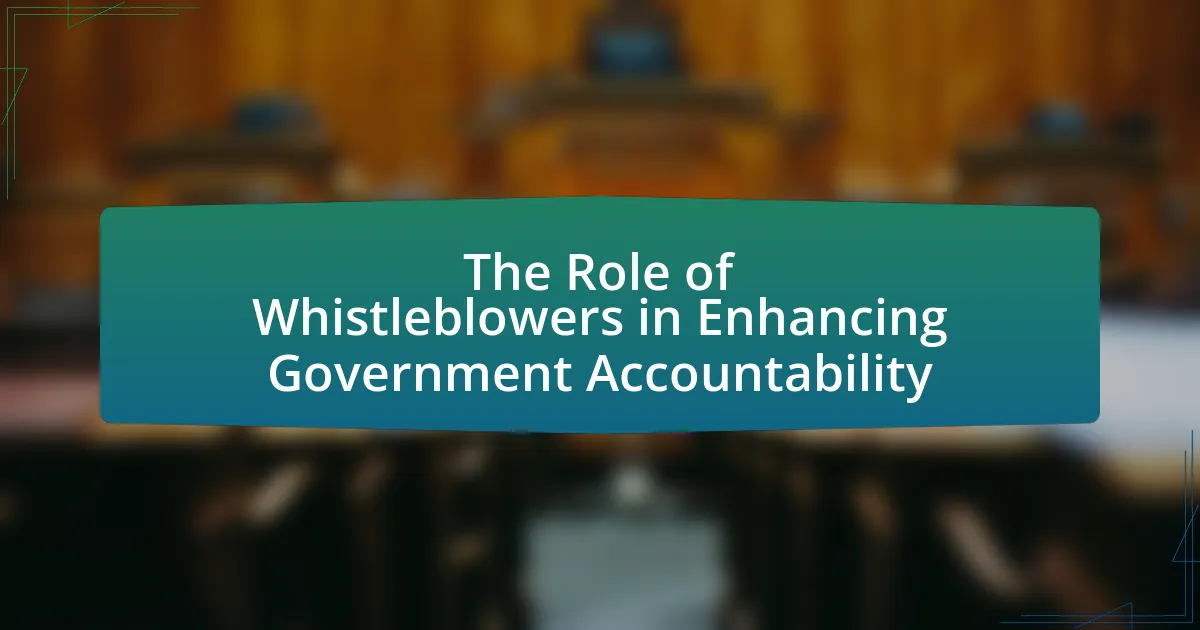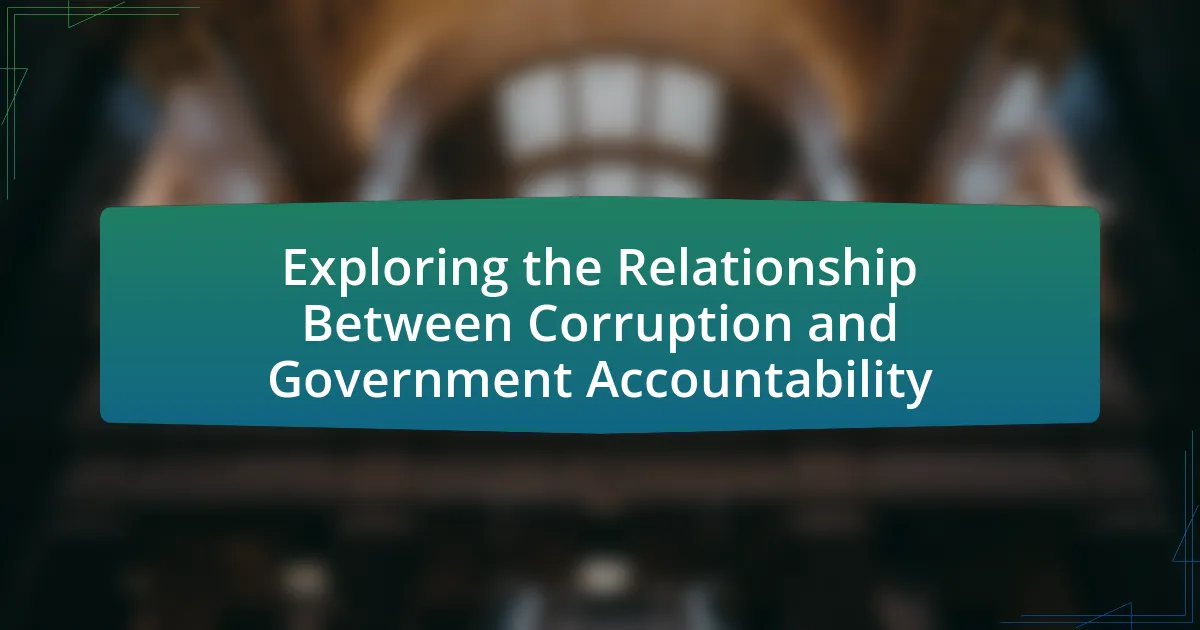The article examines the impact of social media on public accountability in government, highlighting how platforms like Twitter and Facebook enhance transparency and citizen engagement. It discusses the transformation of public accountability through real-time communication, the role of social media in facilitating direct interactions between citizens and officials, and the importance of accountability in fostering trust in government. Additionally, the article addresses challenges posed by misinformation and echo chambers, while outlining strategies for governments to leverage social media effectively. It concludes with insights on future trends and the role of citizen activism in promoting accountability.

What is the Impact of Social Media on Public Accountability in Government?
Social media significantly enhances public accountability in government by facilitating real-time communication and transparency. Platforms like Twitter and Facebook enable citizens to engage directly with government officials, report issues, and demand responses, thereby increasing governmental responsiveness. For instance, a study by the Pew Research Center found that 69% of adults in the U.S. use social media, which has become a vital tool for civic engagement and oversight. This increased interaction allows for greater scrutiny of government actions, as citizens can share information widely and mobilize support for accountability initiatives.
How has social media changed the landscape of public accountability?
Social media has significantly transformed the landscape of public accountability by enabling real-time communication and widespread dissemination of information. This shift allows citizens to hold government officials accountable more effectively, as platforms like Twitter and Facebook facilitate immediate reporting of misconduct and policy failures. For instance, the Arab Spring demonstrated how social media mobilized public opinion and organized protests against government corruption, leading to regime changes in several countries. Additionally, studies indicate that increased social media engagement correlates with higher levels of civic participation and scrutiny of public officials, reinforcing the demand for transparency and accountability in governance.
What role does social media play in enhancing transparency in government?
Social media enhances transparency in government by facilitating direct communication between officials and citizens, allowing for real-time dissemination of information. This immediacy enables governments to share updates on policies, decisions, and public services, thereby reducing information asymmetry. For instance, a study by the Pew Research Center found that 69% of adults in the U.S. use social media, which provides a platform for citizens to engage with government entities and hold them accountable. Additionally, social media allows for public feedback and discourse, which can lead to increased scrutiny of government actions and policies, further promoting transparency.
How does social media facilitate citizen engagement in governance?
Social media facilitates citizen engagement in governance by providing platforms for direct communication between citizens and government officials. These platforms enable citizens to express their opinions, share information, and mobilize for collective action, thereby increasing transparency and accountability in government processes. For instance, studies have shown that social media campaigns can significantly influence public policy decisions, as seen in the Arab Spring, where citizens utilized platforms like Twitter and Facebook to organize protests and demand governmental reforms. This direct interaction fosters a sense of community and empowers citizens to hold their governments accountable, ultimately enhancing democratic participation.
Why is public accountability important in government?
Public accountability is crucial in government because it ensures that officials are answerable for their actions and decisions, fostering transparency and trust among citizens. When government entities are held accountable, it promotes ethical behavior and deters corruption, as evidenced by studies showing that increased transparency leads to reduced instances of fraud and mismanagement. For example, the World Bank has reported that countries with strong accountability mechanisms experience better governance outcomes, including improved public service delivery and enhanced citizen engagement.
What are the key principles of public accountability?
The key principles of public accountability include transparency, answerability, and enforcement. Transparency ensures that government actions and decisions are open to scrutiny, allowing citizens to access information about public spending and policy-making. Answerability requires public officials to explain their actions and decisions to the public, fostering a culture of responsiveness. Enforcement involves mechanisms to hold officials accountable for their actions, such as audits, investigations, and legal consequences for misconduct. These principles are essential for maintaining trust in government and ensuring that public officials act in the best interest of the community.
How does public accountability affect trust in government?
Public accountability significantly enhances trust in government by ensuring transparency and responsiveness to citizens. When government officials are held accountable for their actions, it fosters a sense of reliability and integrity among the public. Research indicates that higher levels of public accountability correlate with increased citizen trust; for instance, a study by the World Bank found that countries with robust accountability mechanisms experience greater public trust in government institutions. This relationship is further supported by data showing that transparency initiatives, such as open data platforms, lead to improved perceptions of government performance and legitimacy.
What challenges does social media pose to public accountability?
Social media poses significant challenges to public accountability by facilitating the rapid spread of misinformation and creating echo chambers that distort public perception. Misinformation can undermine trust in government institutions, as seen during events like the COVID-19 pandemic, where false information about health measures proliferated online, leading to public confusion and skepticism. Additionally, echo chambers reinforce existing biases, making it difficult for citizens to engage with diverse viewpoints, which is essential for informed public discourse. This environment can hinder accountability, as citizens may not hold officials responsible based on accurate information, ultimately affecting democratic processes and governance.
How can misinformation on social media undermine accountability?
Misinformation on social media undermines accountability by distorting public perception and eroding trust in institutions. When false information spreads rapidly, it can lead to misinformed opinions and decisions among the public, which in turn diminishes the ability of citizens to hold government officials accountable for their actions. For instance, a study by the Pew Research Center found that 64% of Americans believe that misinformation has caused confusion about basic facts, which can hinder informed civic engagement and oversight. This lack of clarity allows officials to evade scrutiny, as the public may be misled about their performance or the implications of their policies.
What are the risks of social media echo chambers for public discourse?
Social media echo chambers pose significant risks to public discourse by reinforcing biases and limiting exposure to diverse viewpoints. These echo chambers create environments where individuals primarily encounter information that aligns with their pre-existing beliefs, leading to polarization and a diminished capacity for constructive dialogue. Research indicates that echo chambers can exacerbate misinformation, as users are less likely to question or critically evaluate content that resonates with their views. A study published in the journal “Nature” found that misinformation spreads more rapidly in homogenous groups, highlighting the detrimental effects on informed public discourse. Consequently, the risks associated with social media echo chambers include increased societal division, reduced critical thinking, and a weakened democratic process.
How do different social media platforms influence public accountability?
Different social media platforms influence public accountability by facilitating real-time communication, enabling transparency, and fostering civic engagement. Platforms like Twitter and Facebook allow citizens to share information rapidly, which can hold government officials accountable for their actions. For instance, during the Arab Spring, social media was instrumental in mobilizing protests and disseminating information about government abuses, demonstrating its power in promoting accountability. Additionally, studies show that increased social media usage correlates with higher levels of public scrutiny and engagement in political processes, as citizens leverage these platforms to demand accountability from their leaders.
What unique features of Twitter contribute to government accountability?
Twitter’s unique features, such as real-time communication, public visibility, and the ability to amplify voices, significantly contribute to government accountability. The platform allows citizens to instantly share information and opinions, enabling rapid dissemination of government actions and policies. This immediacy fosters transparency, as users can question and critique government decisions in real-time. Additionally, Twitter’s public nature means that government officials are often held accountable for their statements and actions, as they can be scrutinized by a wide audience. Research indicates that social media platforms like Twitter have been instrumental in mobilizing public opinion and facilitating civic engagement, which further pressures governments to act responsibly.
How does Facebook facilitate community discussions on government actions?
Facebook facilitates community discussions on government actions by providing a platform for users to share information, express opinions, and engage in dialogue. The platform’s features, such as groups, pages, and comment sections, enable users to create dedicated spaces for discussing specific government policies or actions. For instance, Facebook groups focused on civic engagement allow members to post updates, share articles, and organize events related to government accountability. Additionally, Facebook’s algorithm promotes content that generates engagement, which can amplify discussions around government issues. Research indicates that social media platforms like Facebook play a significant role in shaping public discourse and increasing civic participation, as evidenced by the rise of online activism and movements that have gained traction through these channels.
What strategies can governments employ to leverage social media for accountability?
Governments can employ strategies such as transparency initiatives, public engagement campaigns, and real-time feedback mechanisms to leverage social media for accountability. Transparency initiatives involve sharing information about government actions and decisions through social media platforms, which fosters trust and allows citizens to hold officials accountable. Public engagement campaigns encourage citizen participation in discussions and decision-making processes, enhancing the democratic process. Real-time feedback mechanisms, such as polls and surveys conducted via social media, enable governments to gauge public opinion and respond to citizen concerns promptly. These strategies have been shown to improve public trust and accountability, as evidenced by studies indicating that increased government transparency correlates with higher citizen satisfaction and engagement.
How can governments effectively communicate with citizens through social media?
Governments can effectively communicate with citizens through social media by utilizing targeted messaging, engaging content, and real-time interaction. Targeted messaging ensures that information reaches specific demographics, enhancing relevance and impact. Engaging content, such as videos, infographics, and interactive posts, captures attention and encourages sharing, which amplifies the message’s reach. Real-time interaction allows governments to respond promptly to citizen inquiries and concerns, fostering a sense of community and trust. According to a 2020 study by the Pew Research Center, 69% of adults in the U.S. use social media, indicating a significant platform for governments to disseminate information and engage with the public.
What best practices should governments follow to enhance accountability via social media?
Governments should adopt transparency, engagement, and responsiveness as best practices to enhance accountability via social media. Transparency involves openly sharing information about government actions, decisions, and policies, which builds trust with citizens. Engagement requires actively interacting with the public, addressing concerns, and soliciting feedback, fostering a sense of community and participation. Responsiveness means promptly addressing inquiries and criticisms, demonstrating that the government values citizen input and is accountable for its actions. Research indicates that governments employing these practices can significantly improve public trust and participation, as evidenced by studies showing that transparent communication leads to higher levels of citizen satisfaction and engagement in democratic processes.
What future trends can we expect regarding social media and public accountability?
Future trends in social media and public accountability will likely include increased transparency through real-time information sharing and enhanced citizen engagement. As governments adopt social media platforms for communication, they will be held more accountable by the public, leading to a demand for timely responses and actions. Research indicates that 70% of citizens expect governments to use social media for transparency, as highlighted in the 2022 Digital Government Survey by the OECD. Additionally, the rise of fact-checking initiatives and digital literacy campaigns will empower users to critically assess information, further promoting accountability.
How might emerging technologies impact the relationship between social media and government accountability?
Emerging technologies significantly enhance the relationship between social media and government accountability by facilitating real-time information dissemination and increasing public engagement. For instance, advancements in artificial intelligence and data analytics enable citizens to analyze government actions and policies more effectively, leading to greater scrutiny. A study by the Pew Research Center indicates that 69% of Americans believe social media helps hold government officials accountable, demonstrating the growing reliance on these platforms for transparency. Additionally, blockchain technology can provide immutable records of government transactions, further ensuring accountability and trust in public institutions.
What role will citizen activism play in shaping future accountability measures?
Citizen activism will play a crucial role in shaping future accountability measures by leveraging social media to mobilize public opinion and demand transparency from government entities. Activists utilize platforms like Twitter and Facebook to organize campaigns, share information, and hold officials accountable for their actions, as evidenced by movements such as Black Lives Matter and the Arab Spring, which effectively used social media to amplify their messages and influence policy changes. This direct engagement fosters a culture of accountability, as citizens increasingly expect responsiveness and transparency from their governments, thereby compelling officials to adopt more stringent accountability measures.
What practical steps can citizens take to promote accountability through social media?
Citizens can promote accountability through social media by actively sharing information about government actions and policies, engaging in discussions, and holding officials accountable for their decisions. By utilizing platforms like Twitter, Facebook, and Instagram, individuals can disseminate facts, raise awareness about issues, and mobilize community support for transparency initiatives. For instance, the use of hashtags related to specific government actions can amplify messages and create a collective voice that demands accountability. Research shows that social media campaigns can lead to increased public engagement and pressure on officials to respond to constituents’ concerns, as evidenced by movements like #BlackLivesMatter, which have successfully influenced policy discussions and reforms.




